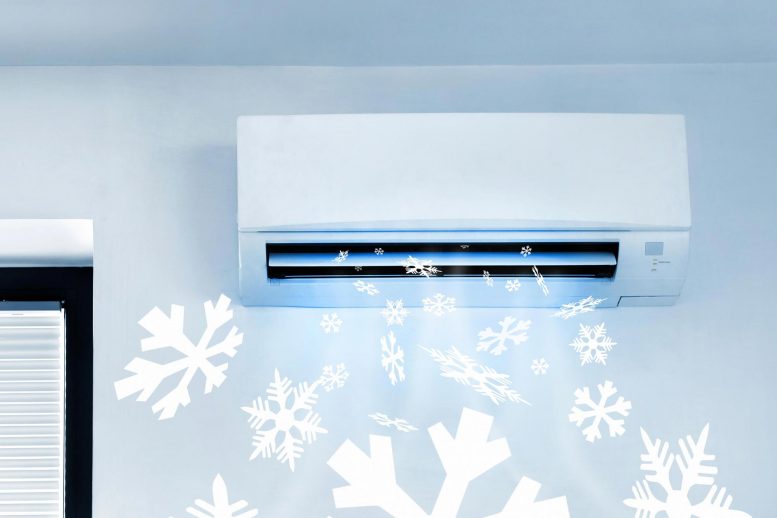
Heat waves are becoming a more regular occurrence across the country. Iain Walker, Leader of the Residential Building Systems Group at Berkeley Lab, has suggestions for how to weather them. Walker has more than 20 years of experience as a building scientist and consultant on energy use and ventilation in residential buildings.
Q. Is it more efficient or economical to keep my house cool all day or to turn the air conditioning up or on when I get home?
You can certainly save energy by not cooling so much when you’re not home. Under normal circumstances for most households, that means during the day when children are at school and the adults are out working. When you leave the house, you can turn the temperature up and when you come home, turn it down. That will basically always save you energy. For people who have a window unit, which is usually in a bedroom, turning it off when they leave the room and on a few hours before going to sleep may be a good choice.

Q. Now with the COVID-19 pandemic people are staying home more. Do you have any recommendations for those who are home all day?
Indeed, many households are not following the usual routines of leaving home during the day. To reduce the effect on your energy bills, one pandemic-related recommendation we have is to try to ventilate your home more. If you do this at night (for example by opening windows) when it is cooler outdoors, this extra night-time ventilation may keep your house cooler while also reducing the risk of disease transmission.
Q. Would any other approaches save me money or be more efficient?
People often use air conditioning when it’s the hottest and everyone turns theirs on at the same time. That creates a big, big peak in the electricity use for utilities. Most peak electricity generating equipment burns fossil fuels, so the carbon content of the electricity is higher at peak conditions. It’s also more expensive in places with “time of use” electric rates. Pre-cooling is a solution. Instead of waiting to come home to turn on your air conditioner when everybody else does at 5 p.m., you might cool your house from 2 to 4 p.m., then not cool for two or three hours. You often use a little bit more energy with this strategy, but it may be cheaper and emit less carbon.
Q. What measures are the low-hanging fruit for making my home cooler and more efficient?
There’s a whole panoply of cheap or free things you can do if you’re willing to, like opening and closing windows or closing your drapes, curtains, or blinds when it’s very hot and sunny or using ceiling fans to stay comfortable at higher temperatures before you turn on the air conditioning. After that you have to start spending money, whether it’s installing external window shades, putting in new windows, or air sealing and insulating your home.
With insulating, put plenty of insulation in the attic. Insulate in the attic first before you do the walls because you get the best bang for the buck. And venting your attic correctly is important. This isn’t well known, but if you talk to a good contractor, it’s relatively inexpensive to get some good attic venting. In the summer as the sun shines on the roof, you’ve got hot air that heats up the attic, and you want a vent to let that hot air out.
Q. When should I replace my air conditioner for a more modern unit?
First, check your air conditioning ducts and insulate them. Many homes have leaky air ducts, and numerous studies have shown that 25% to 30% of the cooled air escapes from them. Insulating air ducts also helps keep cooled air cool. Getting your ducts insulated and sealed is absolutely a priority before you replace the air conditioner.
After that, good reasons for replacing your air conditioner include if it’s more than 10 years old, if its SEER [Seasonal Energy Efficiency Ratio] rating is less than 13, or whenever other HVAC [heating, ventilation, and air conditioning] work is happening. If you decide to replace your air conditioner, go for the most efficient one you can find. The best available use half the energy of the least efficient ones.
Q. What does science have in store for future efficient homes?
Cool roofs and walls are examples. The basic technology for both is the same: a pigment with reflective properties is added to roofing materials or to paint. The material reflects sunlight and reduces the heat absorbed. Cool roofing materials are available now from many roofing contractors.
An economizer is an automated system that uses sensors to determine the outside temperature. When the temperature drops below a certain level, the system turns off the air conditioner and brings in outdoor air through a large damper. When the air outside becomes too hot, the economizer closes the damper and restarts the air conditioning. These systems are commonly used in commercial buildings, but some contractors can install them in homes. They shouldn’t be used in very humid climates, though, because of the extra humidity they could bring into the home.
Smart ventilation is another example. New homes are built to leak very little air. These homes have a mechanical system, usually a fan, to bring in outdoor air and reduce people’s exposure to indoor pollutants. Berkeley Lab researchers are developing smart ventilation technologies to work with these systems to bring in less outdoor air when it is hotter outside and more when it’s cooler, reducing the energy needed for air conditioning.
Never miss a breakthrough: Join the SciTechDaily newsletter.
3 Comments
A residential economizer would be great. We live in the San Diego area and have a whole house fan that works well, but it pulls in a lot of dust through the windows. An economizer would filter the air before mixing it with the return air, and also choose the correct ratio of return air to outdoor air. We recently replaced our SEER 13 unit (propane heat) with a high efficiency zoned heat pump system. None of the major manufacturers seems to offer an economizer option. I don’t know why this is, it seems like a no-brainer.
Hello, Awesome Article, and Your information about Efficient AC Use is very amazing and so much useful for me. Keep it up and thank you very much.:)
What a beautiful content on the tips for keeping cool during the heat waves. This article is very helpful and informative. I loved reading this article. I am sure many people will come to read this article in future. Keep sharing such informative articles in future, will be appreciated.